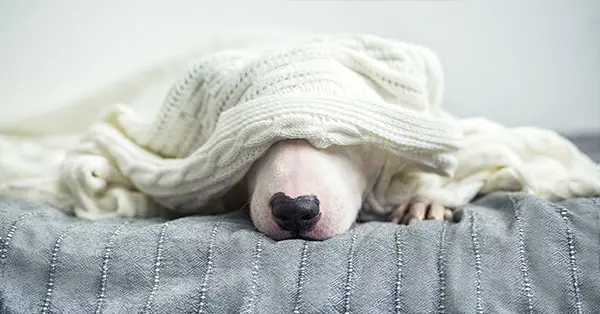Vomiting and Diarrhea: Can It Wait Until Morning?
No pet parents want to face this situation…
You get home from work, ready to have dinner and then relax. But, as soon as you open the door to your home, you notice there’s a funny smell.
Upon a little searching, you realize your furry best friend had an upset tummy, and has vomited or had diarrhea while you were out. And, your pal seems to be feeling down, with less energy than usual.
Your regular vet is already closed. So, do you take your pet in to an emergency or urgent care veterinarian, or do you wait until morning?
Unfortunately, there’s no easy answer to this question. And there’s no “one size fits all” answer that will be correct for every pet. Instead, the answer depends on a number of different factors.
Signs that your dog or cat needs to go to the vet right away
Often, if a pet has vomiting or diarrhea, they may be feeling down compared to their normal selves—less energetic and less playful. They may also eat less, due to nausea or stomach pain, or inability to keep food down.
Just like for humans, an upset stomach is no fun for your furkids. So, it’s expected that they’ll act different than usual. However, here are some signs that you’ll want to bring them to the vet sooner rather than later:
- Multiple occurrences of vomiting or diarrhea.
- Vomiting for more than 12 hours or diarrhea that goes on for more than 24 hours.
- Noticeable loss of energy, lethargy, or an inability to stand and walk.
- Loss of appetite (won’t eat anything) for more than one meal.
- Blood in the vomit or stool.
- Visible parasites or worms in the vomit or stool.
- If you believe they’re in pain; or if they yelp, cry, or try to bite or scratch you when you try to touch the affected area(s).
- Dehydration. This is a common problem, even if your dog or cat is still drinking water. That’s because they lose fluids and electrolytes in vomit and watery stool. So, try these two tricks to check your pet’s hydration:
- Check their gums. The gums should be moist. If they’re dry and pale, your pet may be dehydrated.
- Check for “skin tenting.” To do this, pull up gently on the skin between your pet’s shoulder blades. The skin should relax back into place right away. However, if you notice skin tenting (meaning the skin doesn’t sink back down right away to its normal position), then your buddy is probably dehydrated.
Of course, regardless of symptoms, it never hurts to be on the safe side—so when in doubt, it’s always best to seek veterinary advice.
Even for non-serious cases of vomiting and diarrhea, the vet can often relieve your furry pal’s symptoms and help them feel better. That way, you’ll both sleep better that night.
Why is my dog or cat throwing up, or having loose stool?
Here are some of the most common reasons why your pet might have an upset stomach:
- Eating something they shouldn’t have (table scraps, getting into the garbage can, or picking up something outside).
- Food allergies and food sensitivities.
- Stress (a common cause of diarrhea during boarding).
- Parasites.
- Mild infections.
More dangerous causes of vomiting and diarrhea include:
- Toxins (for example, chocolate, pesticides, and certain plants).
- Metabolic illnesses affecting the liver, kidneys, pancreas, or gall bladder.
- Serious infections, such as Parvovirus in dogs.
- Hormonal disorders.
- Foreign objects that can get stuck in the stomach or intestines (like a toy ball).
- GI ulcers.
How do veterinarians know if the vomiting and diarrhea are serious?
If your pet is otherwise feeling well, there’s a good chance that they’re perfectly fine, albeit uncomfortable with an upset stomach.
In all cases, the veterinary staff will ask you some questions about your pet’s history. For example, if they’re indoor or outdoor, what diet they normally eat, if they’ve eaten anything unusual recently, etc. The information you give will help them make a list of the most likely causes.
Then, the veterinarian will perform a physical exam of your dog or cat. This tells them many important things about your pet, including whether they’re dehydrated, have a fever, or have a painful belly. They will also look for evidence of any underlying diseases causing the upset stomach.
Since pets can’t tell us what’s wrong, your vet may also recommend routine diagnostic tests, which may include:
- Fecal (stool) analysis
- Bloodwork and urine analysis
- Radiographs (X-rays)
- Tests for infectious diseases
Normal test results bring good news and peace of mind. However, if there are any abnormal findings, your vet will explain them and partner with you to determine the next step.
What will make my pet feel better?
Your veterinarian will prescribe treatments, which may vary depending on exactly what would benefit your pet the most. Common treatments include:
- A short period of fasting (for adult pets).
- A bland diet, such as plain chicken and rice, or a prescription diet for sensitive stomachs.
- Fluids given at the veterinary clinic (this helps restore hydration and electrolytes, which are commonly lost via the vomit and diarrhea).
- Medications for nausea and to help firm up the stool.
- Treatments for underlying causes (for example, antibiotics or de-wormers).
Remember, don’t give your dog or cat human medications without checking with the vet first—many are toxic to pets, and there are safe alternatives available at your vet’s office. Also, be sure to follow up with your vet, as directed, if your buddy’s symptoms aren’t improving.

